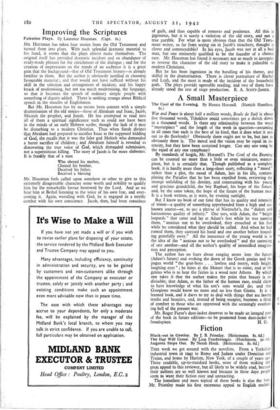Improving the Scriptures
Palestine Plays. By Laurence Housman. (Cape. 6s.)
MR. HOUSMAN has taken four stories from the Old Testament an turned them into plays. With such splendid dramatic material t his hand, it seems that the plays almost make themselves. Th original itself has provided dramatic incident and an abundance o ready-made phrases for the enrichment of the dialogue ; and for th creation of impressions on the minds of an audience it is a grea gain that the background—that of Old Testament history—is alread familiar to them. But the author is obviously justified in choosin favourable material ; and that would not have sufficed without hi skill in the selection and arrangement of incident, and his happ knack of modernising, but not too much modernising, the language so that it becomes the speech of ordinary simple people with something of dignity added. There is nothing strange about Biblica speech in the mouths of Englishmen.
But Mr. Housman has by no means been content with a simpl dramatisation of the old stories—those of Abraham and Isaac, Jacob Micaiah the prophet, and Jonah. He has attempted to read int all of them a spiritual significance such as could not have bee in the minds of an early Hebrew scribe, though the lack of it ma be disturbing to a modern Christian. Thus when Sarah divine that Abraham had prepared to sacrifice Isaac at the supposed biddin of God, she recalls that it was the false god Moloch who demanded
y c a burnt sacrifice of children ; and Abraham himself is revealed a discovering the true voice of God, which demanded submission not a superstitious killing. The story of Jacob is far more elaborate It is frankly that of a man Who obeyed his mother, Cheated his brother, Deceived his father, Received a blessing Mr. Housman feels called upon somehow or other to give to thi extremely disagreeable character some worth and nobility to qualif him for the remarkable favour bestowed by the Lord. And so w hear him at Bethel listening to the voice of his own fear, and over coming it. Again, wrestling with God, he is engaged in a terrifi combat with his own conscience. Jacob, then, had been consciou d
e, n
g
•
e
of guilt, and thus capable of remorse and penitence. All this is ingenious, but it is surely a violation of the old story, and not a
true parable, For what is obvious than that the Old Testa- ment writer, so far from seeing sin in Jacob's treachery, thought it clever and commendable? In his eyes, Jacob was not at all a bad man, but one eminently qualified to be the founder of a chosen race. Mr. Housman has found it necessary not so much to interpret as reverse the character of the old story to make it palatable to modern Christians.
But he has been ingenious in the handling of his theme, and skilful in the dramatisation. There is clever portraiture of Rachel and Leah, and the most is made of the incident of the household gods. The plays provide agreeable reading, and two of them have already stood the test of stage production. R. A. SCOTT-JAMES.


























 Previous page
Previous page